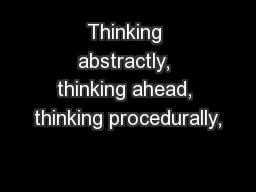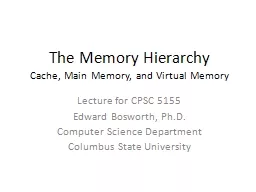PPT-thinking about learning and memory
Author : kittie-lecroy | Published Date : 2015-11-28
Memory Types of memory CNS regions memory impairments Learning Models for learning Memory Processing if attended Shortterm Memory STM Limited capacity 7 items can
Presentation Embed Code
Download Presentation
Download Presentation The PPT/PDF document "thinking about learning and memory" is the property of its rightful owner. Permission is granted to download and print the materials on this website for personal, non-commercial use only, and to display it on your personal computer provided you do not modify the materials and that you retain all copyright notices contained in the materials. By downloading content from our website, you accept the terms of this agreement.
thinking about learning and memory: Transcript
Download Rules Of Document
"thinking about learning and memory"The content belongs to its owner. You may download and print it for personal use, without modification, and keep all copyright notices. By downloading, you agree to these terms.
Related Documents














